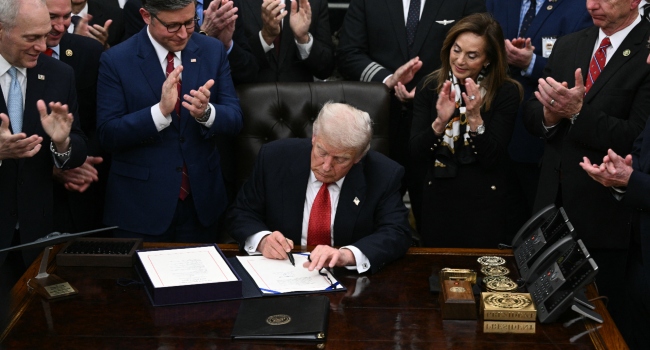WASHINGTON: US President Donald Trump on Wednesday signed a congressional bill to end the United States’ longest-ever government shutdown, a 43-day standoff that crippled federal operations, grounded air travel, and left hundreds of thousands of civil servants without pay.
The Republican-led House of Representatives passed the Senate-approved package earlier in the day, despite resistance from Democrats who accused their party’s Senate leaders of conceding too quickly.
Trump signed the measure in the Oval Office, surrounded by Republican lawmakers, including House Speaker Mike Johnson.
“Today we are sending a clear message that we will never give in to extortion,” Trump declared, while blaming Democrats for the shutdown and urging voters to remember the crisis in next year’s midterm elections.
The funding package restores operations at federal departments and agencies, including the Department of Agriculture, Veterans Affairs, Congress, and military construction projects through next fall. Other parts of the government will be funded through January.
About 670,000 furloughed federal workers are set to return to their jobs, while an additional 670,000 who worked without pay including over 60,000 air traffic controllers and airport security officers will receive back pay.
The deal also reinstates federal employees dismissed during the shutdown.
Air travel disruptions that intensified over the past week are expected to gradually ease.
Speaker Johnson accused Democrats of intentionally inflicting hardship.
“They knew that it would cause pain, and they did it anyway, he said on the House floor. “The whole exercise was pointless. It was wrong and it was cruel.
With Republicans holding a slim two-vote majority, the bill’s passage required tight party discipline.
Democratic leaders, angry that Senate Democrats agreed to a deal they consider weak, urged their members to vote against the package an order most followed.
Throughout the shutdown, polls consistently showed public sympathy leaning toward the Democrats’ position.
The party had refused to reopen the government without a commitment to extend pandemic-era health insurance tax credits that helped millions afford coverage.
Democratic victories in state elections last week had strengthened the party’s resolve. But eight Senate moderates broke ranks, striking a compromise with Republicans that offered only a Senate vote on healthcare subsidies without guaranteed House approval.
The agreement triggered deep frustration within the party. Several House Democrats demanded the resignation of Senate Majority Leader Chuck Schumer, while progressive activists accused Senate Democrats of surrendering.
House Minority Leader Hakeem Jeffries, however, insisted that Democrats had succeeded politically by spotlighting healthcare, a central issue for their 2026 midterm campaign.
We have elevated successfully the issue of the Republican health care crisis, and we’re not backing away from it, Jeffries told MSNBC.
Outside Washington, leading Democratic figures reacted sharply. California Governor Gavin Newsom called the agreement pathetic, Illinois Governor JB Pritzker dismissed it as an empty promise, and former transportation secretary Pete Buttigieg labelled the deal a bad one.
Trump claimed without evidence that Democrats had cost the country $1.5 trillion. Although full economic data is pending, the Congressional Budget Office estimates losses of at least $14 billion in stalled growth, with broader impacts still under review.
The shutdown’s resolution now shifts political attention toward the 2026 midterms, where both parties see healthcare and the chaos of the past six weeks as defining issues



